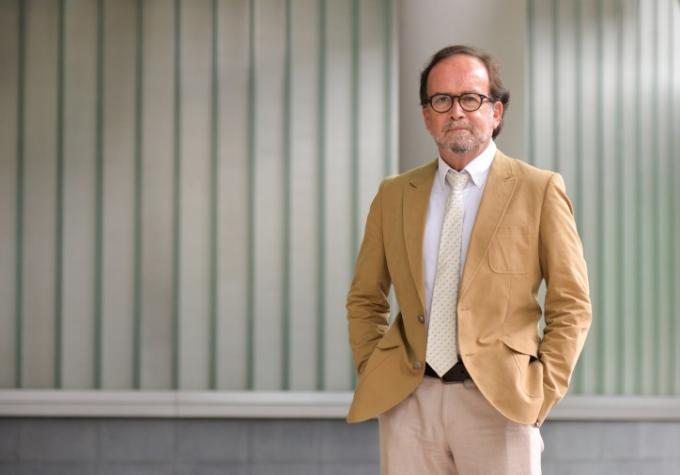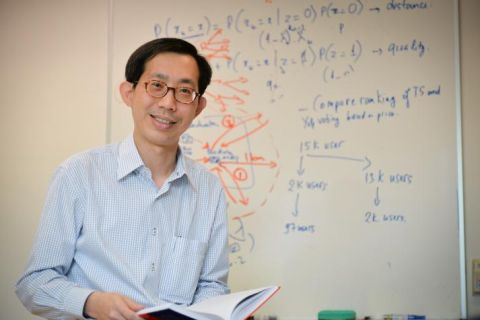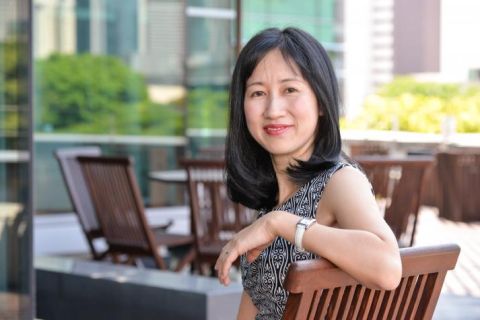
Professor Mark Findlay from the SMU School of Law highlights the need to study how criminal justice systems can better serve the victims of war crimes and calls for more cross-disciplinary research in the legal field.

Photo Credit: Cyril Ng
By Dora Yip
SMU Office of Research (17 Jun 2014) – As conflicts around the world continue to span multiple countries, criminal justice systems have also evolved to become international institutions. But how do these international institutions regulate transnational crime, and to what extent do alternative justice processes satisfy legitimate victim interests?
Eager to find practical solutions to the complex problem of global justice service delivery, Professor Mark Findlay from the Singapore Management University (SMU) School of Law has extensively researched this topic, talking to families and victims of genocide, war crimes and crimes against humanity. His research focus on the constituency of global justice interrogates how victim communities can more effectively participate, and be satisfactorily involved in their justice outcomes. The applied dimension of this research is to assist institutions such as the International Criminal Court in delivering justice more effectively.
Victims do not simply want retribution
Professor Findlay’s early research focused on the unique features and challenges of global justice versus nation-state level crime and security issues. “A crucial distinguishing feature of international criminal justice was the magnitude of crimes we were dealing with. At a global level, the interest of victims should be more prominent than at the nation and state level,” he says.
The need to recognise and satisfy legitimate victim interests at the global level has motivated his current research direction, where he analyses the critical processes for determining and discriminating what victims really want. “Whether they are victims of genocide or war crimes, what do victims rightfully expect the system to produce? How can we expand opportunities for them to participate? And how do we balance that against the protection of the accused?” he asks.
His findings show that victims demand more than just prosecution and punishment of offenders for their actions. “They are looking for their stories to be told, and to be offered some peace and security that was not available at the time they were harmed.” He gives an example of a refugee who had suffered under para-military fighting. When asked what she would want most, she simply asked for safety, so that she would not have to live constantly in fear.
“The thought of hundreds of thousands of people getting up every day without the comfort of safety is a challenging concept,” he says. This knowledge motivates Professor Findlay to study alternative outcomes which the justice system could focus on. A 2013 book he wrote, titled International and Comparative Criminal Justice: a critical introduction, examined these issues from a wide cultural perspective.
Thinking beyond borders
Similarly, Professor Findlay hopes that his other book Contemporary Challenges in Regulating Global Crises, which was also published last year, will stimulate readers to think about issues beyond their immediate national context, and to consider their responsibilities as global citizens.
“Some of the methods we use to regulate our lives and society seem to cause more problems than they solve,” he says. Citing countries that regulate migrant labour through the use of limited immigration for residency and work, he explains that saying to migrants they can work in a country but only under very limited conditions creates dangerous social and market vulnerabilities because these workers do not feel secure. Linking labour to residency without stringent regulation of workplace relations can lead to the development of labour black-markets, and a surge in undocumented workers who tend to work in unsafe conditions.
Good regulatory intentions may have resulted in vigorous inspection of employment facilities to discover and protect undocumented workers, as seen in the EU. However, undocumented workers face deportation if they are exposed, often leading them to live in terrible conditions just to evade the authorities. “The paradox is that sometimes we unwittingly do things which exacerbate problems for migrant workers, especially when labour and migration regulations intersect,” he notes.
More collaboration in legal research
Quoting Professor of Jurisprudence William Twining from the University College London, Professor Findlay says that legal academics need to focus on two things in their work. First, they must recognise themselves as writers as well as researchers. “We must be able to communicate what we know to as many people as possible. Charles Dickens, in his novel Bleak House, says that lawyers speak a mysterious language so we can charge more money. We need to open our skills up to more accessible communication.” Second, legal researchers need to confront alternative views and explanations as they work in a wider world.
Professor Findlay advises that legal academics must focus on relevance if they do not want to be left out of the regulatory mix. “In the case of intellectual property for example, I confront my students with the realisation that every one of them commits criminal activities every day. They download things unlicensed from the Web and don’t think anything of it. Most people under 30 don’t seem to respect IP regulations.” As such, trying to punish people for downloading is not viable, he says. “Lawyers need to help people with patents and trademarks to negotiate more creative ways of sourcing and transacting the wealth that IP should produce. Instead of trying to exclude people from access, they should try to create opportunities for people to gain access within realistic regulatory regimes,” he continues.
One way to generate better outcomes is by encouraging legal academics to cross-fertilise. “We need to look at practical ways to solve problems by sharing the regulatory challenges. Some lawyers don’t like this, as they view their reputations as made and marketed by specialising in narrow fields. But we are living in a world that is very much cross-disciplinary, and it is important for young and mid-career academics to engage in other ways of thinking.”
Although he finds that many students still are attracted to law school because they want to make money, it is becoming clear that this will not be their professional experience even in the middle term. “The nexus between a university degree and a good job is not going to be so absolute in the future,” he says. “When I arrived in Singapore in 2009, I looked at the ways in which young lawyers approached their training, and I was anxious to offer them other forms of critical thinking.”
With that in mind, Professor Findlay sees himself working with mid-career and developing legal academics to uncover opportunities in new areas of research. “I want to create a network that enables young graduates to develop academic and professional careers in ways that are more exciting and less conventional than what they would have otherwise done,” he says.
See More News
Want to see more of SMU Research?
Sign up for Research@SMU e-newslettter to know more about our research and research-related events!
If you would like to remove yourself from all our mailing list, please visit https://eservices.smu.edu.sg/internet/DNC/Default.aspx

